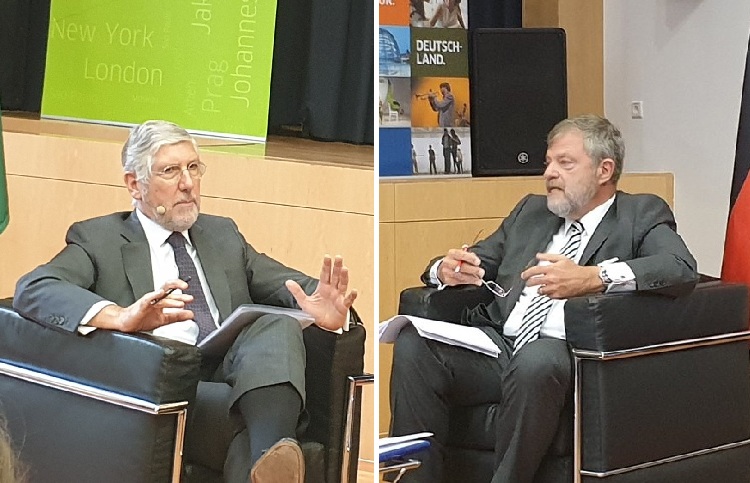Eduardo González
The ambassadors of Portugal and Germany, the two countries that have held the last presidencies of the EU Council, yesterday praised the European response to the crisis generated by the pandemic but did not show the same degree of optimism when it came to assessing the changes experienced by Europe and the future consequences of the recovery.
The German representative in Spain, Wolfgang Dold, and his Portuguese counterpart, Joao Mira-Gomes, participated yesterday at the Goethe Institute in the round table Europe Next – a look into the future, moderated by the deputy director of the newspaper La Vanguardia, Enric Juliana, and in which the director general of Integration and Coordination of General Affairs of the EU, José Pascual Marco Martínez, and the director of the Office of the European Parliament, María Andrés Marín, also took part.
During the meeting, María Andrés said that, after the pandemic was declared, the EU took, “at a very unusual speed”, a series of “very forceful decisions that we would have liked to take in the previous crisis, the financial crisis of 2008”. The culminating point, she continued, was the July 2020 summit at which the European Recovery Plan was approved, which meant “the recovery of the sense of solidarity of the European project, which had been compromised with the 2008 crisis or with the migratory crisis of 2015”, not only “because of the amount of funds committed, but also because of the way of financing the recovery, with half through transfers and opening the door to European debt”. “Things are being done well and we must know how to put it on the table and create an exciting project”, she added.
For his part, José Pascual Marco recalled that, “with a fall of 10% GDP in some countries and an increase of 6 to 8% in public debt, the markets have moved, interest rates have not moved and thanks to ERTES and other programs we have managed to stop the shock and we have good prospects for growth”. “The response to the crisis has been of a high grade”, he assured. “That is the EU, let’s imagine what it would have been like if everyone had gone their own way”, he continued. Despite this, he lamented, the EU continues to “whip itself and shoot itself in the foot” because in matters of “image and communication we are very bad”. “The United States has announced that it could release patents for vaccines, when the United States has banned the export of vaccines and the EU has exported twice as many as it has used; therefore, communication is very important and is something we have to improve”, he warned.
In his response to these interventions, Wolfgang Dold opted for caution. “I have never poured water on wine, but this time I am going to do it”, he said. “It is true that the agreement reached last year was a historic milestone, a turning point, but we have to be cautious that expectations are not too high,” because “Europe has not changed as much as we might think”, he warned. “Especially, the outlook on fiscal policy has not changed much, and we will certainly be discussing stability rules in Europe again in a few years, when we have used the recovery fund, and that debate will depend on the good use of that fund”, he added.
For his part, Joao Mira-Gomes took up his colleague’s baton to restore optimism. “I don’t add water to wine because I like wine a lot and I like water a lot”, he said. “My starting point is that the European Union, as a Union, is better off today than it was before COVID, there is no doubt in my mind, and that is why I do not admit the possibility of backtracking on progress”, he said. “For once we have taken quick decisions, and that should be the pattern, not the exception”, he warned. “What we have to do is act because the European response is very important to combat right and left-wing populisms”, he continued. “I find no better model for our countries, for my country, Portugal, than the EU. Portugal is one of the most pro-European countries in the EU, as is Spain, because we know how to value European support during our democratic transitions”, said the ambassador.






